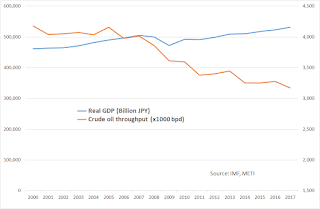Refinery crude oil throughputs in Japan during the first half of October dropped below 2.5 million barrels per day for the first time since the late 1960's, according to data released by the Petroleum Association of Japan.
The nation's petroleum demand basically has shown a downward tendency after peaking out in the middle of the 1990's. Even so, recent slump presents an impression that irreversible direction led by the change of social structure is accelerating the decrease regardless of the economic cycle.
The real gross domestic product in Japan indicates relatively steady growth after lowered by the global financial crisis in 2008 and the regional heavy earthquake in 2011. However, crude oil throughputs keep apparent decrease since even before the financial crisis.
The recent breakdown for petroleum products shows that motor gasoline accounts for 31% of the total production, while 24% are gas oil outputs followed by fuel oil that is used for electric generation and industrial fuel, then petrochemical naphtha etc. Thermal power generation also uses low sulfur crude oil besides the fuel oil. Typically, 20-30% more amounts of fuel oil than crude oil are utilized for the purpose.
Regarding automobile fuels that are the majority of Japanese petroleum products, we have concerns about slowing down of domestic car sales especially for young generations. Although the number of passenger vehicles owned keeps steady growth since the beginning of this century despite the slow sales, fuel demand doesn't track the same path. Gasoline production has deepened decrease after the 2011 earthquake. Constriction of household spending seems to be one of the major causes as well as increasing hybrid cars. Meanwhile, gas oil output is not impacted by a gradually decreasing number of tracks owned. Track utilization rate in the transportation industry looks to be rising. Industrial efficiency is improving but consumer spending is shrinking.
The petroleum industry is also pursuing efficiency. The total oil refinery capacity in Japan has been scrapped by 25% in the 2010's after utilization rates had dipped to the 70% level in the late 00's. The operational efficiency in the oil industry has improved significantly through the aggressive streamline of facilities.
What has occurred about electricity generation fuel that is the next major usage following motor fuel? There were 59 nuclear units with a total of 51 million kW of power generation capacity before the serious earthquake in March 2011. All those units ceased operations due to damage or security inspections. Then only 9 nuclear units have been approved to resume. Current total available capacity is 9.1 million kW. 22 units including those in Fukushima-1 and 2 nuclear power plants will be scrapped, and no specific restart plan has been decided for rest of units. Nuclear power accounted for 27% of the total electricity generation in Japan in 2010; however, it was merely 3% in 2017.
Electricity supply in Japan was in the severe turmoil after losing the entire nuclear power generation. There were many aged thermal power units urgently resumed from the idling status. However, such high necessities for oil-burning power was finished in 2012, and it was already backing to the normal level in 2014 despite all nuclear units were still suspended. Petroleum demand for electricity generation is declining further due to lower entire power demand, steady growth of generation with burning coal or liquefied natural gas, and resume of some nuclear units. The era that needs petroleum for electricity generation is going to end.
Japanese manufacturers have moved their factories overseas and domestic infrastructure and lifestyle are changing to that need less energy usage. Meanwhile, as the country requires importing almost all of the primary energy resources, such transition could reduce the vulnerability of its security.






Dear Sir/Madam.
ReplyDeleteWe AO "URAL-NEFT-SERVICE a legal and official mandate to Russia Refineries that are capable to supply to any real buyers any petroleum product/ We supply petroleum products. Our products are guaranteed to meet the International Standard Specifications. Our products are mainly the Mazut M100, Aviation Kerosene-Jet Fuel 54,Jet A1,SN 590 Virgin D6 Fuel Oil, D2 Diesel Oil.
Kindly contact us through our official company details below.
E-mail:marketing@uraloil-service.ru
Tel: +7926-745-37-03
whatssap: +7926-745-37-03